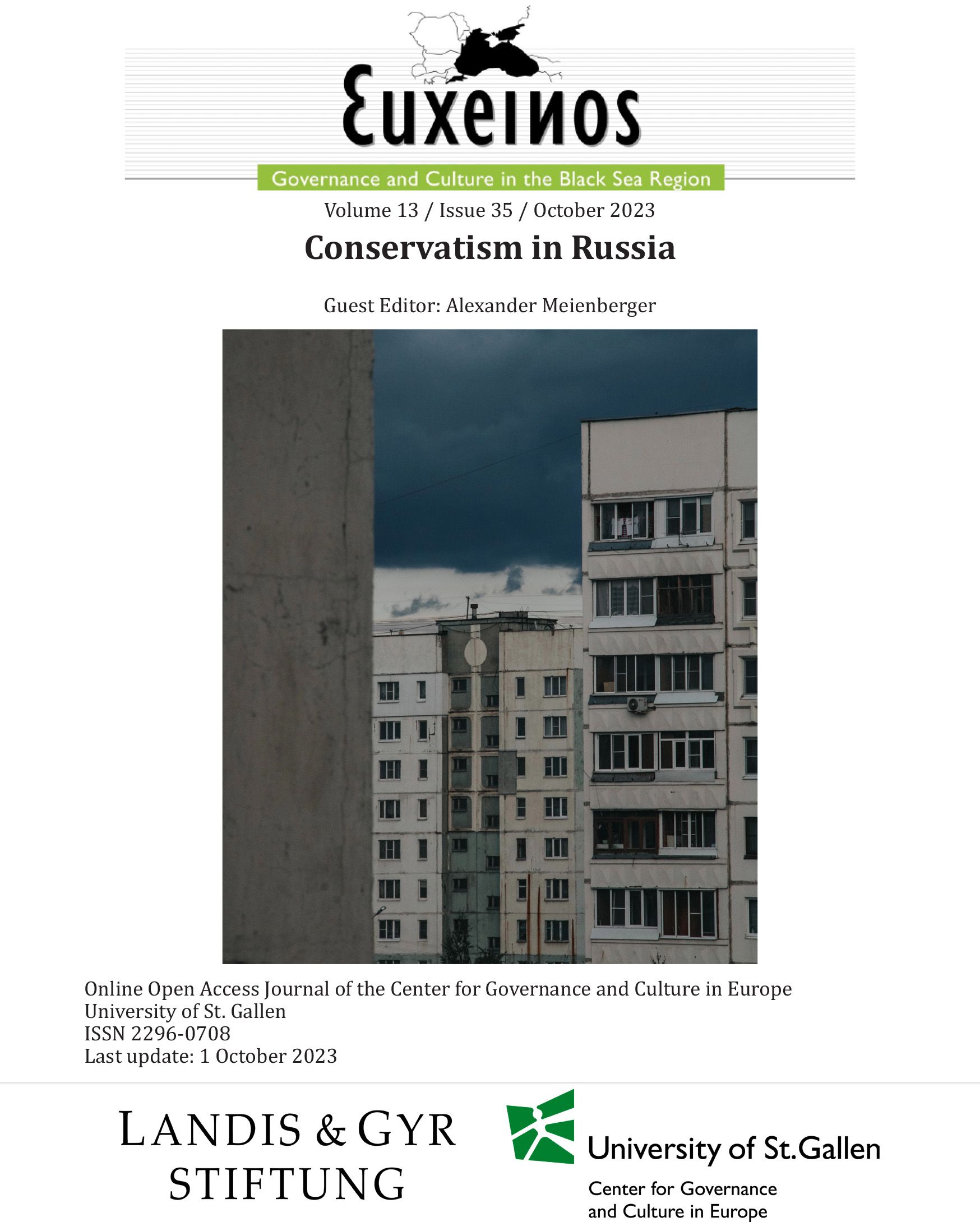Euxeinos vol. 13, Issue 35: Conservatism in Russia

Online Open Access Journal of the Center for Governance and Culture in Europe
University of St. Gallen
October 2023
Guest Editor: Alexander Meienberger
Editorial by Alexander Meienberger
The Scandalous Electoral Victory of the Governing Party United Russia by Alexander Kynev
With unprecedented restrictions on voting rights and electoral manipulations, the governing party United Russia succeeded in gaining a comfortable majority in the Russian Duma elections despite growing dissatisfaction in the country. The secret winner of the election is the Communist Party, which unlike the other opposition parties increased its share of votes. During the parliamentary elections in Russia between 17 and 19 September 2021, the governing party United Russia officially won 324 of the 450 seats in the State Duma with 49.82 percent of votes. The results of the election again give the governing party a two-thirds majority, enabling it to amend the Constitution. However, its results are worse than in 2016, when United Russia received 54.2 percent of votes and 343 seats. At the same time, the approval rates for the party remained at a stable low of 27 to 28 percent during the entire electoral campaign according to the official sociological Russian Public Opinion Research Center.
The Concept of the “Russkiy Mir”: History of the Concept and Ukraine by Alexander Meienberger
The concept of the “Russkiy Mir” has cultural and geopolitical implications. Since the Russian annexation of Crimea in 2014, the concept has started to play a significant role as a propaganda instrument and as justifying tool for Russian military aggression in Ukraine. However, it was not always the case. It was not until 2007 that the Kremlin institutionalized the concept by creating a foundation called Russkiy Mir. Until this time, the concept was not widespread among the Russian elites. Later, Russian politicians articulated the "Russkiy Mir" differently and without its exact meaning. So, emerged three different understandings of the "Russkiy Mir": a global sphere of the Russian language and/or Russian-speaking diaspora, the geopolitical sphere of influence of Russia, an ideological sphere of the new conservative right-wing forces. By analyzing the idea’s roots in the Russian context using published sources, the article shows how the “Russkiy Mir” developed from a nonpolitical and loose idea that should unite all Russian-speaking people around the globe to a geopolitical tool Russia uses to justify its influence in the post-soviet space, particularly in Ukraine. Moreover, the article aims to answer the question of to what extent, from a Russian state view, Ukraine plays a role in this concept.
Silenced Dissent in the Russian Orthodox Church by Regula M. Zwahlen and Natalija Zenger
The official support of Russia’s war against Ukraine by the leadership of the Russian Orthodox Church has silenced most of the voices of existing dissent. However, before February 2022, there were different reactions from the church to various waves of protest. While the church leadership spoke of a “crisis of the young generation”, individual clergy members showed understanding for the outrage over the state repressions and the lack of prospects perceived by the youth. Under the current circumstances, there is little room for anti-war action by Orthodox clergy and laity, but some are seizing the opportunities left to them.
What will the Russian Diaspora Do When "Dvizhukha" Starts at Home? by Sergei Erofeev
This 2021 paper discusses the prehistory and some elements of political culture of the new Russian emigration which has been growing since the return of Putin as Russia’s president. Following a sociological study, I argue that a qualitative change occurred between 2012 and 2018 in the moods and action predispositions of the new émigrés which can contribute to a strong anti-authoritarian political culture of a significant part of the diaspora. Small recent additions deal with the Seventh Wave of emigration caused by Putin’s war in Ukraine, and the possibilities of structuration and further mobilization of the cross-border Russian prodemocracy movement.
War Economy: Russia's Economic Development in 2022 by Roland Götz
After Russia’s invasion of Ukraine, numerous institutes predicted a significant economic slump in Russia in 2022 due to the tightened Western sanctions. This did not materialize. As the energy sector remained almost completely exempt from sanctions until the end of 2022, Russia’s economy saw a significant inflow of foreign currency. This prevented a collapse of the financial system. Statistical data show that in 2022 the war economy was strengthened at the expense of the civilian economy.
